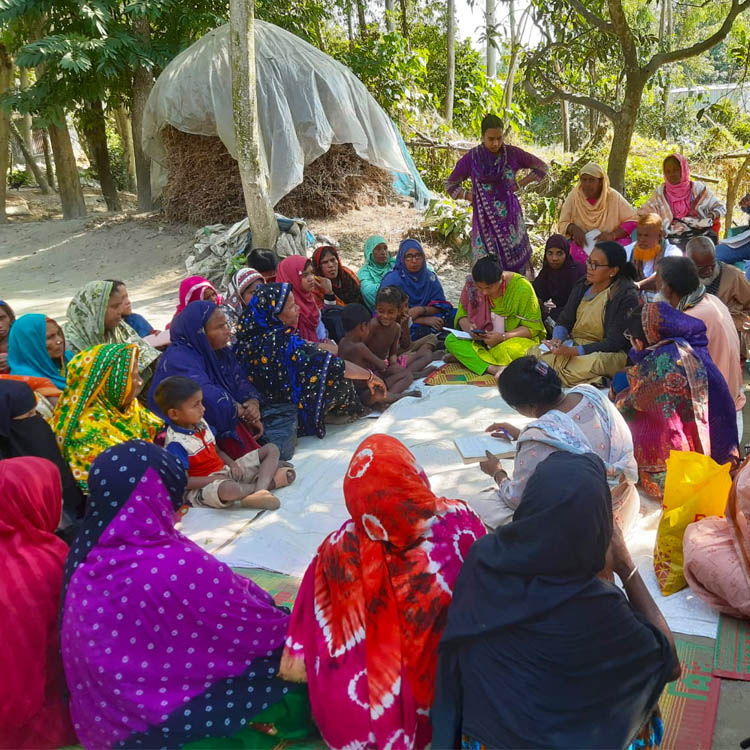Exchange Program of “Women and Biodiversity Network

Introduction:
Meeting for exchange of experiences among Nayakrishi farmers with “Women and Biodiversity Network”, members. The event was held on Thursday, 28 November 2024. There were 30 participants in the meeting including women members of 12 organizations – 1. Rupali Molila Unnayon Sangstha, Netrokona; 2. Shomota Nari Unnayon Sangstha, Chapainababganj; 3. Tithi Mohila Unnayon Shamity, Nilphamari; 4. Rural Development Center, Magura; 5. Janani Seba Sangstha, Thakurgaon; 6. Chetona Mohila Sangstha, Narsingdi; 7. Association for Rural Development (ARD), Brahmanbaria; 8. Human Development Organization (HDO), Comilla; 9. Association for Alternative Development (AFAD), Kurigram; 10. Shatabdi shamaj Kalyan Sangstha, Dhaka; 11. Program for Women Development (PWD), Shirajganj; and 12. Nice Foundation, Khulna of “Women and Biodiversity Network”, farmers, staff members of three centers of UBINIG – 1. Ridoypur Biddaghar, Tangail; 2. Arshinagar Biddaghar, Ishwardi and 3. Nobopran Andalon, Kushtia.
The participants departed from Ridoypur Biddaghor, Tangail for Shahajadpur at 8.00 am. The exchange of experiences was held with the Nayakrishi farmers of Bantiar village, Shahjadpur upazila. The participants enjoyed the journey by boat over The Jamuna river to reach Bantiar village. The farmers of Bantiar village including Solaiman Hosain, Joynal Abedin Khan and Ansar Mia guided the visiting team to field visit. The standing crops in the field included mustard, grass pea and boro rice seed bed. Most of the crops in this char land are sown by broad casting the seeds. The soil is rich with siltation and thus there is no need of applying chemical fertilizer.
Mixed Cropping:
Mustard, grass pea and field pea were grown in mixed culture. There were uncultivated self-sown vegetables like kalmi sak and bathua sak. Aman rice varieties including dhepa dhan, digha dhan, Kartikjhul, bokjhul, sada dhepa, malvog and hijaldigha are grown in the kharif season. The standing crops in the field including potato, onion, mustard, brinjal, water gourd, sweet gourd, spinach, radish and red amaranth were visited.
Discussion session was organized in the residence of the farmers after the field visit. In course of discussion in the meeting it was mentioned that there were 13 Nayakrishi villages in Sonatoni union. The farmers were pleased to mention that UBINIG has been conducting diverse activities in this locality for last 15 years. UBINIG has significantly contributed helping the community surviving against river erosion by construction of bamboo binding (chatka). The construction of chatka not only checked river erosion but also land accretion.

In addition, UBINIG helps the farmers with seeds of different varieties of crops including aus rice, aman rice, vegetables, pulses, oil seeds and spices.
Now, we have learned the art of maintaining seeds in our own hands.
In this exchange program the farmers shared their experiences of pest management by crop rotation and mixed cropping.
Seed Exchange:
The participating farmers mentioned that they also not need to buy seed from market and companies. In times of need of seed the farmers exchange among themselves in the community.
In case of land erosion, Champa Begum, a farmer mentioned that they had to move for new shelter for five times in their family life of 23 years. It was mentioned in course of discussion that some farmers had to move for new shelter 15-20 times in their life time.
The farmers mentioned that they can not grow many plants for heavy sands, flood and water-logging.
The main source of transport is boat and horse cart in some cases.
The farmers use grass and straw for mulching in potato and onion crops.
The farmers in the char land rear varieties of cows, goats, ducks and chickens. They mainly rear local breeds of livestock and poultry birds.
